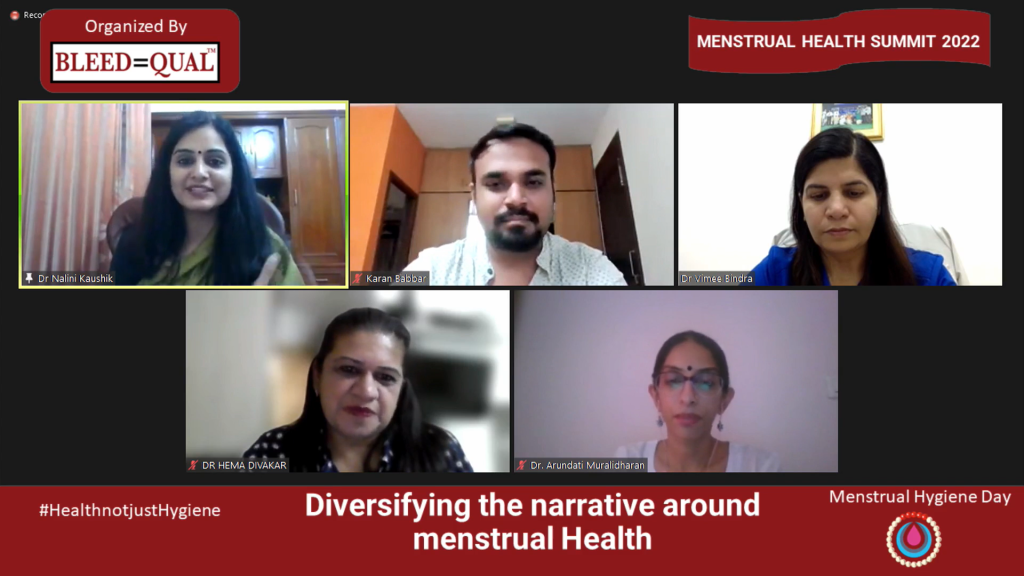Mumbai: Menstrual Hygiene Day, an annual global advocacy day observed on 28th May, is dedicated to bringing together the voices and actions of non-profits, government agencies, individuals, the private sector, and the media to promote good menstrual health and hygiene (MHH) for all menstruating individuals. The theme for this year “’making menstruation a normal fact of life by 2030” highlights the need to create a conducive environment for menstruators situated all over the globe to enable them to manage their menstruation in a safe and dignified manner without shame.
Through such continued efforts, a new definition of menstrual health was developed in 2021 by a group of global experts from the United Nations and the World Bank that recognized menstrual health as “a state of complete physical, mental, and social well-being and not merely the absence of disease or infirmity”, recognizing a positive and respectful environment as one of the many precursors for enabling menstruators to make informed choices for themselves. Against this backdrop, on the occasion of Menstrual Hygiene, BleedEqual in collaboration with PCOS Club as the community partner, organized the first Menstrual Health Summit 2022 that brought together speakers from diverse backgrounds, who sought to look beyond the two aspects of hygiene and access.
The Menstrual Health Summit was divided into three broad sessions, each moderated by experts with a commitment to advancing good menstrual health for all.
The First session titled ‘Diversifying the narrative around Menstrual Health’ was moderated by Dr. Nalini Kaushik, who was joined by a panel of expert speakers like Dr. Hema Divakar, Dr. Vimee Bindra, Dr. Arundati Muralidharan and Mr. Karan Babbar. “The link between menstruation and overall health has been largely overlooked for decades. A large share of the global discussions about menstruation have focused on adolescent health and hygiene management, and while this has led to improved health outcomes, the larger connections that contribute to a menstruator’s general health and well-being, however, have been overlooked. At BleedEqual, we are striving to define and understand Menstruation as an important health matter that is responsible for the overall well-being of an individual”, stated Dr. Nalini Kaushik, Founder, BleedEqual.
Dr. Hema Divakar, who is a strong advocate for ensuring a continuum of care beyond the reproductive phase of life for every individual noted that, “The unspoken issues and link between menstruation and anemia often go unnoticed even by healthcare professionals till today. By viewing menstruation and general health in silos and only through the lens of the reproductive capacity of an individual, we have failed to tackle the larger health problems in a holistic manner. The prevention and care for common disorders relating to other gynecological conditions, to aging, to diseases such as osteoporosis, breast cancer, and cardiovascular disease can only come about when we begin to view menstrual health as vital indicator of one’s overall health”.
The second session, moderated by Dr. Prerna Kumar, Technical Specialist, ICRW, was dedicated to “Exploring a Menstruator’s Basket of Choice and the ‘Right to Choice’. Elaborating on the importance of a menstruator’s right to choose, Mr. Kartik Johari, Vice President, Nobel Hygiene Pvt Ltd., stressed “There exists a diverse population of menstruating individuals, each with their own unique needs and experience. The most important step to addressing menstrual health is to normalize the process of menstruation and ensure that individuals have the right to be comfortable with the products they use and are able to adequately meet their health requirements during any phase of their life, even beyond the menstruation. Whether they are dealing with heavy bleeding, menopause or conditions like PCOS, we must make sure that everyone’s needs and experiences are accounted for. This is why it is extremely important to provide for array of products for different life phases and not restrict an individual’s choice to any one kind of product”. Accompanying him for the session were Dr. Monalisa Padhee, Mr Karan Babbar and Ms. Zuhrat Mafuza Inam.
Ms. Nidhi Singh, Founder, PCOS Club India chaired the third session titled “Beyond Periods: Understanding the Hormonal Manifestations”, which focused on the need to understand hormonal health and its role in maintaining a healthy menstrual cycle. It further deep-dived into the hormonal disorder of PCOS and its impact on menstruating and menopausal individuals. The session saw the participation from speakers who included Dr. Apoorva Appalam Reddy, Dr. Shivani Sachdev Gour, Ms. Sunaina Rekhi and Ms. Pooja Ajwani. “PCOS is a widely spread but less talked about disorder in women and an often-misunderstood hormonal disorder. The stigma associated with menstruation and PCOS combined inhibits individuals from seeking care in the early stages. The need is to empower individuals with correct information and a holistic approach so that they can apply techniques and focusing on a sustainable approach to healing their bodies”, remarked Ms. Nidhi Singh as she brought the session to a close.

